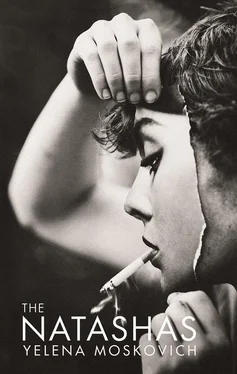Her skin turned so pale that even the square-faced boy became concerned. Still chewing at her breast with his free hand, he gave Béatrice a bit of worldly advice.
“Breathe through your nose, Miss Playboy …” he said.
Finally a teacher came into the hallway, her face curdled with anger at the noise. As she looked around, her expression quickly changed. A proud smile began to grow on her face at the sight of all those young boys and girls so passionately singing their country’s anthem.
2
That was the day her father asked her about the boys in her class when she got home from school. He stood observing his daughter’s curious silence.
“…You okay, honey?” he asked gently.
Béatrice looked at her father but let her eyes glaze over.
“ Do-bee do-bee doo… ” she sang lightly.
Her father lifted his hand towards his daughter’s face, extending his forefinger. He traced an evaporating line around her chin.
“Miss Monroe,” he whispered and smiled.
3
After high school, Béatrice surprised everyone by failing all of her entrance exams into the top music conservatories. Her sister Emmanuelle was shocked as well, but somehow had the feeling all along that Béatrice was bound for this disappointment, and even more so, that this was only the beginning. Emmanuelle sensed this not because she wished her sister harm, but because she seemed to be the only one in the family to see that her beautiful sister was dying in a way, dying faster than the eye could see. This is perhaps what made Béatrice such a feast for the fantasies of others.
Béatrice cried in her father’s arms as he assured her that failing these exams was not the end of the world. “No,” Béatrice replied, “it’s the beginning of a world I don’t want to live in!”
“Miss Monroe,” her father said gently, “it’s up to you… you can live in whatever world you want…”
This phrase kept coming back to Béatrice. It told her again and again that she was lost. She wished her father could have assured her that no matter what her failures, she would go on living in the same world as everyone else, in the same world where all those jazz women sing in turns, where people win Nobel Prizes, and flowers grow symmetrically in gardens.
But her father did not assure her of this. He gave her a set of words that reminded her that she did not live in the same world where brilliant things happened, because she lacked brilliance. She lived in another world, the world she deserved , because she was without the capacity of courage or ingenuity required to want brilliance.
One day soon after her results had come through, her father found his Marilyn Monroe crouched in the corner of her room, her chignon undone, meshes of blonde hair swinging into her gasping cheeks as her hands grabbed at her own face. He ran to her side and began stroking her back, repeating in a low, loving voice, “Breathe through your nose, honey, breathe through your nose…”
4
For a time, she decided not to decide. She stayed in her room, fogged with an expansive feeling of meaninglessness. She did not speak. She did not sing. She opened her mouth to breathe but exerted no energy beyond that.
Her father came home with a pair of over-sized, cushioned headphones. He placed them on his daughter’s ears, then plugged the cord into the computer. He pulled up Nina Simone, slowly adjusting the sound like running the right temperature for a bath. When the volume was right, he left the selection on repeat. Béatrice lay detached, with each headphone like a child’s hand cupped over her ears. Days passed like this. Maybe years. Many women sang to her of many pains and many joys.
And eventually, music came back to Béatrice.
5
Music came back to Béatrice as armour, as a revolt. She sang. In her room, down the stairs, in the shower, in the kitchen, in the garden. Her father watched her graze on music throughout the house, then cork herself in her room for hours at a time, perfecting, tuning, waxing a shine on to those notes. His listless teenager evaporated like a magic trick and through the smoke a woman emerged with her blonde hair brushed up into a neat chignon, revealing two cold ears. This woman sang like the child he once knew, but no longer in a borrowed voice.
With her father’s persistent encouragement, she got in touch with bars and restaurants needing a jazz singer, and she started to sing in the evenings, small concerts for couples sipping wine or twirling linguine around their forks. These turned into steady jazz gigs, and then a regular booking at a bigger bar near the Gare de l’Est. Here, the trains rummaged beneath the floor of the bar and made the furniture hum along with Béatrice as she sang.
6
It was for this very gig that Béatrice needed a dress. She walked out of the central metro on to the boulevard. She passed several stores, but her resolve to find a dress was already losing its momentum. The streets were filled with Saturday morning shoppers. A woman with a stroller stopped abruptly and yelled “Constance!” A little feather-haired girl ahead turned around and wobbled back to her mother.
A man in a business suit leaned against a wall and smoked a cigarette with his flat cell phone pressed into his ear like a shell.
“Pierre.” “Monsieur Levalois.”
Then he pulled it away, shaking his head with a grimace.
A girl in tight, bleached jeans shouted a name into the crowd. Her nails were painted a marble blue. “Baptiste!”
Julie. Fred. Anne-So.
A stiff plastic bag was being adjusted in someone’s hand.
“Pardon. Pardon. Pardon.”
Anaïs. Ludovic.
“Madame, Madame.”
“Juju.” Sophie “Toi!”
Sofia, Sofia.
“ Ya ?”
Yvette. Pavla…
“ Ya ?”
Viktoria.
Olena.
Salomeya!
“ Ya? Da ?”
“Hello, hello.”
“Who is this?”
7
Béatrice pulled the glass door of a small shop closed behind her. The music in the boutique buzzed gently as if it were being played from between the walls. The sound went in and out of focus like a wavering radio station. A guitar strum. A voice dipped in, a woman. Maybe a flower behind her ear. Maybe her hips clocked from side to side.
The static pushed apart the chords of the guitar and swallowed the voice of the female singer. For a moment there was only white noise, which matched the walls. Then the voice emerged and the chords from the guitar in the background seemed to caress the singer’s hair, until her voice calmed down and disappeared back into the static.
The white wall was lined with two rows of white shelves on each side. The shelves were empty. In the oblong space in the middle of the boutique was a rack of clothes. At the back of the shop a doorway was covered by a heavy green curtain hung on wooden rings across a metal bar.
In front of the curtain was a small counter with the cash register. The shopkeeper sat on a stool, looking through an open notebook, adding up numbers. Her hair was dark and heavy, parted in the middle. She did not seem to mind the broken music, perhaps she even kept the radio deliberately between stations.
Béatrice felt that the woman was sure she wouldn’t buy anything, so she was obliged to reach towards the rack and start flipping through the clothes to defend herself. The woman looked up. “Bonjour” she said with a rolled “r”. Her tan skin had an ashen tone. Her lips were full and dry.
The woman’s cheekbones sloped in a way that made Béatrice think that she had lost her watch or that she couldn’t have children. But the pupils of her eyes were strong and rimmed with gold.
Читать дальше












